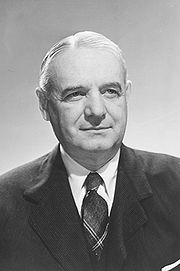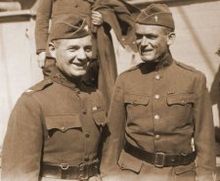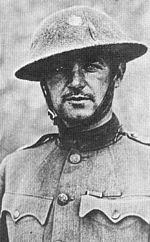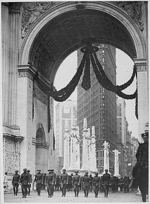- William J. Donovan
-
For the baseball pitcher and manager, see Bill Donovan.
William Joseph Donovan 

Nickname "Wild Bill" Born January 1, 1883
Buffalo, New YorkDied February 8, 1959 (aged 76)
Washington, D.C.Place of burial Arlington National Cemetery Allegiance  United States of America
United States of AmericaService/branch United States Army Years of service 1912-1922
1941-1946Rank  Major General
Major GeneralCommands held 165th Infantry Regiment (World War I)
Office of Strategic Services (World War II)Battles/wars World War I
World War IIAwards Medal of Honor
Distinguished Service Cross
Distinguished Service Medal (3)
Purple Heart (2)
Freedom Award[1]Other work U.S. Attorney
Wall StreetWilliam Joseph Donovan (January 1, 1883 – February 8, 1959) was a United States soldier, lawyer and intelligence officer, best remembered as the wartime head of the Office of Strategic Services (OSS). He is also known as the "Father of American Intelligence" and the "Father of Central Intelligence."[2][3]
Contents
Early life
Of Irish descent, Donovan was born in Buffalo, New York to first generation immigrants Anna Letitia "Tish" Donovan née Lennon and Timothy P. Donovan, of Ulster and County Cork origins respectively. His grandfather Timothy O'Donovan (Sr.) was from the town of Skibbereen, being raised there by an uncle, a parish priest, and married Donovan's grandmother Mary Mahoney, who belonged to a propertied family of substantial means which disapproved of him. They would move first to Canada and then to New York, where their son Timothy (Jr.), Donovan's father, would attempt to engage in a political career, but with little success. This waited for his son in other arenas.
William Joseph attended St. Joseph's Collegiate Institute and Niagara University before starring on the football team at Columbia University. On the field, he got the nickname that would stick with him for the rest of his life, Wild Bill Donovan.[2][4] Donovan graduated from Columbia in 1905 and was a member of the Phi Kappa Psi fraternity,[2][5] as well as the Knights of Malta.[6]
Donovan was a graduate of Columbia Law School and became an influential Wall Street lawyer. In 1912, Donovan formed and led a troop of cavalry of the New York State Militia, that in 1916 served on the U.S.-Mexico border in the Pancho Villa campaign.
World War I
During World War I, Major Donovan organized and led the 1st battalion of the 165th Regiment of the 42nd Division, the federalized designation of the famed 69th New York Volunteers, (the "Fighting 69th"). In France one of his aides was poet Joyce Kilmer, a fellow Columbia College alumnus. For his service near Landres-et-St. Georges, France, on 14 and 15 October 1917, he received the Medal of Honor. By the end of the war he received a promotion to colonel, the Distinguished Service Cross and two Purple Hearts (the full text of his Medal of Honor citation can be found further below).
Between the wars
 Colonel Donovan (left) with Father Duffy upon their return from France
Colonel Donovan (left) with Father Duffy upon their return from France
From 1922 to 1924, he was US Attorney for the Western District of New York, famous for his energetic enforcement of Prohibition. President Calvin Coolidge named him to the United States Department of Justice's Antitrust Division. He ran unsuccessfully as a Republican for Lieutenant Governor of New York in 1922, and for Governor of New York in 1932.
World War II
During the interwar years, Donovan travelled extensively in Europe and met with foreign leaders including Mussolini of Italy. Donovan openly believed during this time that a second major European war was inevitable. His foreign experience and realism earned him the attention and friendship of President Franklin D. Roosevelt. The two men were from opposing political parties, but were similar in personality. Because of this, Roosevelt came to highly value Donovan's insights. Following Germany's invasion of Poland in September 1939 and the start of World War II in Europe, President Roosevelt began to put the United States on a war footing. This was a crisis of the sort that Donovan had predicted, and he sought out a responsible place in the wartime infrastructure. On the recommendation of Donovan's friend United States Secretary of the Navy Frank Knox, Roosevelt gave him a number of increasingly important assignments. In 1940 and 1941, Donovan travelled as an informal emissary to Britain, where he was urged by Knox and Roosevelt to gauge Britain's ability to withstand Germany's aggression. During these trips, Donovan met with key officials in the British war effort, including Winston Churchill and the directors of Britain's intelligence services. Donovan returned to the US confident of Britain's chances and enamored with the possibility of founding an American intelligence service modeled on that of the British.
OSS
On July 11, 1941, Donovan was named Coordinator of Information (COI). America's foreign intelligence organizations at the time were fragmented and isolated from each other. The Army, Navy, Federal Bureau of Investigation (FBI), United States Department of State, and other interests each ran their own intelligence operations, the results of which they were reluctant to share with the other departments. Donovan was the nominal director of this unwieldy system, but was plagued over the course of the next year with jurisdictional battles. Few of the leaders in the intelligence community were willing to part with any of the power that the current ad hoc system granted them. The FBI, for example, under the control of Donovan's rival J. Edgar Hoover, insisted on retaining its autonomy in South America.
Nevertheless, Donovan began to lay the groundwork for a centralized intelligence program. It was he who organized the COI's New York headquarters in Room 3603 of Rockefeller Center in October, 1941 and asked Allen Dulles to head it; the offices Dulles took over had been the location of the operations of Britain's MI6.
In 1942, the COI became the Office of Strategic Services (OSS) and Donovan was returned to active duty in his World War I rank of colonel (by war's end, he would be promoted to major general). Under his leadership the OSS would eventually conduct successful espionage and sabotage operations in Europe and parts of Asia, but continued to be kept out of South America as a result of Hoover's hostility to Donovan. In addition, the OSS was blocked from the Philippines by the antipathy of General Douglas MacArthur, the commander of the Southwest Pacific Theater.
For many years the operations of the OSS remained secret, but in the 1970s and 1980s, significant parts of the OSS history were declassified and became public record.
As World War II began to wind to a close in early 1945, Donovan began to focus on preserving the OSS beyond the end of the war. After President Roosevelt's death in April, however, Donovan's political position, which had thrived because of his personal relationship to the President, was substantially weakened. Although he argued forcefully for the OSS' retention, he found himself opposed by numerous opponents, including President Harry S. Truman, who personally disliked Donovan, as well as J. Edgar Hoover, who viewed the OSS as competition for his goal to expand the FBI's investigative operations internationally. Public opinion turned against Donovan's efforts when conservative critics rallied against the intelligence service that they called an 'American Gestapo.' After Truman disbanded the OSS in September 1945, Donovan returned to civilian life. Various departments of the OSS survived the agency's dissolution, however, and less than two years later the Central Intelligence Agency was founded, a realization of Donovan's hopes for a centralized peacetime intelligence agency.
Role in formation of the CIA
Donovan did not have an official role in the newly formed CIA but with his protégé Allen Dulles and others, he was instrumental in its formation. Having led the OSS during World War II, Donovan’s opinion was especially influential as to what kind of intelligence organization was needed as a bi-polar post-war world began to take shape. Although he was a force to be reckoned with, his idea for consolidating intelligence met with strong opposition from the State, War and Navy Departments and J. Edgar Hoover. President Truman was inclined to create an organization that would gather and disseminate foreign intelligence, Donovan argued that the new agency should also be able to conduct covert action. Truman was not a fan of this but Donovan's arguments prevailed and were reflected in the National Security Act of 1947 and the Central Intelligence Agency Act of 1949. In 1946, Truman appointed Rear Admiral Sidney Souers, USNR, as the first Director of Central Intelligence. This was an important first step but the actual creation of the CIA required another persuasive voice, that of Hoyt Vandenberg. In 1947 Rear Admiral Roscoe H. Hillenkoetter was appointed as the first Director of the CIA.[7]
Post-war era
After the war ended, Donovan reverted to his lifelong role as a lawyer to perform one last duty: he served as special assistant to chief prosecutor Telford Taylor at several trials following the main Nuremberg War Crimes Tribunal in Germany. There he had the personal satisfaction of seeing the Nazi leaders responsible for the torture and murder of captured OSS agents brought to justice. For his World War II service, Donovan received the Distinguished Service Medal, the highest American military decoration for outstanding non-combat service. He also received an honorary British knighthood.
At the conclusion of these trials, Donovan returned to Wall Street and his highly successful law firm, Donovan, Leisure, Newton & Irvine. He remained always available to postwar Presidents who requested his advice on intelligence matters.
In 1949 he became chairman of the newly-founded American Committee on United Europe, which worked to counter the new Communist threat to Europe by promoting European political unity.
In 1953 President Eisenhower appointed Donovan Ambassador to Thailand. He served in that capacity until his resignation in 1954.
Donovan's son, David Rumsey Donovan, was a naval officer who served with distinction in World War II. His grandson, William James Donovan, served as an enlisted soldier in Vietnam and is also buried at Arlington.
Donovan died on February 8, 1959, at Walter Reed Army Medical Center, in Washington, D.C. at the age of 76, and is buried in Section 2 of Arlington National Cemetery.
President Dwight D. Eisenhower referred to him as "the Last Hero", which later became the title of a biography of him. After his death, Donovan was awarded the Freedom Award of the International Rescue Committee (not, as some biographies state, the "Medal of Freedom", a different award).
The law firm he founded, Donovan, Leisure, Newton & Irvine was dissolved in 1998.
Major General Donovan is a member of the Military Intelligence Hall of Fame.
List of honors and decorations
American awards
 Medal of Honor
Medal of Honor Distinguished Service Cross
Distinguished Service Cross Distinguished Service Medal with 2 Oak Leaf Clusters
Distinguished Service Medal with 2 Oak Leaf Clusters Purple Heart with 1 Oak Leaf Cluster
Purple Heart with 1 Oak Leaf Cluster National Security Medal
National Security Medal Mexican Border Service Medal
Mexican Border Service Medal World War I Victory Medal with 5 Battle Clasps
World War I Victory Medal with 5 Battle Clasps Army of Occupation of Germany Medal
Army of Occupation of Germany Medal American Defense Service Medal
American Defense Service Medal American Campaign Medal
American Campaign Medal Asiatic-Pacific Campaign Medal with Arrowhead and 2 Bronze Service Stars
Asiatic-Pacific Campaign Medal with Arrowhead and 2 Bronze Service Stars European-African-Middle Eastern Campaign Medal with Arrowhead, 2 Silver Service Stars, and 2 Bronze Service Stars
European-African-Middle Eastern Campaign Medal with Arrowhead, 2 Silver Service Stars, and 2 Bronze Service Stars World War II Victory Medal
World War II Victory Medal Army of Occupation Medal with "Germany" clasp
Army of Occupation Medal with "Germany" clasp Armed Forces Reserve Medal with one ten-year hourglass device
Armed Forces Reserve Medal with one ten-year hourglass device
Foreign awards
- Légion d'honneur (France) (World War I)
- Commandeur de la Légion d'honneur (France) (World War II)
- Croix de guerre with Palm and Silver Star (France) (World War I)
- Honorary Knight Commander of the Most Excellent Order of the British Empire
- Papal Lateran Cross (Vatican) (Italian: Croce Lateranese)
- Knight Grand Cross of the Order of St. Sylvester (Vatican)
- Order of the Crown (Italy)
- Croce di Guerra (Italy)
- Commander's Cross with Star of the Order of Polonia Restituta (Poland)
- Grand Officer of the Order of Léopold of Belgium with Palm
- Czechoslovakian War Cross (1939)
- Grand Officer of the Order of Orange Nassau (Netherlands)
- Grand Cross of the Royal Norwegian Order of St. Olav (Norway)
- Knight Grand Cross (First Class) of The Most Exalted Order of the White Elephant (Thailand)
Medal of Honor citation
Rank and organization: Lieutenant Colonel, U.S. Army, 165th Infantry, 42d Division. Place and date: Near Landres-et-St. Georges, France, 14–15 October 1918. Entered service at: Buffalo, N.Y. Born: 1 January 1883, Buffalo, N.Y. G.O., No.: 56, W.D., 1922.
Citation:
Lt. Col. Donovan personally led the assaulting wave in an attack upon a very strongly organized position, and when our troops were suffering heavy casualties he encouraged all near him by his example, moving among his men in exposed positions, reorganizing decimated platoons, and accompanying them forward in attacks. When he was wounded in the leg by machine-gun bullets, he refused to be evacuated and continued with his unit until it withdrew to a less exposed position.[8]
Quotes
"Espionage is not a nice thing, nor are the methods employed exemplary. Neither are demolition bombs nor poison gas.... We face an enemy who believes one of his chief weapons is that none but he will employ terror. But we will turn terror against him....[citation needed]"
"The door for intelligence work opened for me when I undertook my first secret mission while on my honeymoon in Japan in 1919. The United States Government asked me to take a two-month trip to Siberia to report on the anti-Bolshevik movement in the aftermath of the Russian Revolution. Well, it wasn't your usual honeymoon, but Mrs. Donovan was very understanding. The mission was successful and opened doors to many more missions for the government. I was heading down the intelligence path and I was loving it[citation needed]"
Fiction
- Donovan is featured among other historical figures in the novel Las Increíbles Aventuras de Rex Stark y el Holocausto Secreto (The Incredible Adventures of Rex Stark and The Secret Holocaust) by Juan Miguel de la Torre, Devir, 2004.
- Donovan is a central figure in the W. E. B. Griffin series The Corps, Men at War and Honor Bound.
- Donovan is referenced in Three Days of the Condor. Higgins asks Wabash, "You served in the OSS with Colonel Donovan during the war, didn't you, sir?" Wabash replies, "I sailed the Adriatic with a movie star at the helm". The Adriatic episode is a reference to the OSS activities of Sterling Hayden during World War II.
- Donovan is featured in Peter Quinn's historical novel, The Hour of the Cat.
- Donovan is featured in Gordon Stevens' novel And All the Kings Men. The novel is based in Britain during a successful Nazi invasion. In it, Donovan is credited for, among other things, persuading President Franklin D. Roosevelt to sign the Lend-Lease act and delivering intelligence about the German nuclear energy project and Nazi concentration camps.
- Donovan appears in the historical fiction novel "Tavish's Git" by Tom Maki, in which he plans the escape of a Polish scientist who will help the US develop the atomic bomb.
- Donovan is a major character in the 1940 blockbuster movie, The Fighting 69th[1], set during World War I. It features Pat O'Brien in one of his best roles as Father Francis P. Duffy, Jeffrey Lynn as the poet Joyce Kilmer, and George Brent as Major 'Wild Bill' Donovan.
- Col. Roy Campbell of the Metal Gear series of video games strongly resembles Donovan in both appearance and career.
- Donovan was portrayed by Dick O'Neill in the 1979 movie A Man Called Intrepid. William Stephenson (MI5 code name: Intrepid) was played by David Niven.
- Major General Donovan makes an appearance as a base commandant in Striking the Balance by Harry Turtledove.
- General William Sullivan, the character portrayed by Robert De Niro in 2006's The Good Shepherd, is based on Donovan.
- Donovan recruited Malory Archer into the intelligence trade in the television series Archer.
Music
The musician Stan Ridgway on his album Black Diamond included a song title "Wild Bill Donovan". The song deals somewhat vaguely with his founding of the OSS and Cold War exploits.
See also
- List of Medal of Honor recipients for World War I
- List of U.S. political appointments that crossed party lines
- CIA
- Special Activities Division
References
- ^ International Rescue Committee Freedom Award
- ^ a b c CIA: Look Back … Gen. William J. Donovan Heads Office of Strategic Services
- ^ CIA: William J. Donovan and the National Security
- ^ Brown 1982, p. 56.
- ^ Keehn 1910, p. 68.
- ^ Phelan, Matthew (2011-02-28) Seymour Hersh and the men who want him committed, Salon.com
- ^ Clifford, Clark, Counsel To The President, A Memoir, New York: Random House, 1991, 165-66.
- ^ Medal of Honor recipients - World War I
Further reading
- Donovan and the CIA: A History of the Establishment of the Central Intelligence Agency by Thomas F. Troy, CIA Center for the Study of Intelligence, 1981.
- Brown, Anthony Cave (1982). Wild Bill Donovan: The Last Hero. New York: Times Books. ISBN 9780812910216. OCLC 123143243. http://books.google.com/books?cd=2&id=YV3fAAAAMAAJ&dq=wild+bill+donovan&q=wild+bill#search_anchor.
- 'Wild Bill Donovan: The Spymaster Who Created the OSS and Modern American Espionage (2011) by Douglas Waller ISBN 1416567445
- Duffy's War: Fr. Francis Duffy, Wild Bill Donovan, and the Irish Fighting 69th in World War I, by Stephen L. Harris, Potomac Books, 2006.
- OSS: The Secret History of America's First Central Intelligence Agency, by R. Harris Smith, University of California Press, 1972.
- Allen Dulles: Master of Spies, by James Srodes, Washington: Regnery Publishing, Inc., 1999.
- Father Duffy's Story, by Fr. Francis Patrick Duffy, George H. Doran Company, 1919.
- A Doughboy with the Fighting 69th, by Albert M. and A. Churchill Ettinger, Simon & Schuster, 1992.
- The Shamrock Battalion of the Rainbow: A Story of the Fighting Sixty-Ninth, by Martin J. Hogan, D. Appleton, 1919.
- Into Siam, by Nicol and Blake Clark, Bobbs-Merrill, 1946.
- No Banners, No Bands, by Robert Alcorn, D. McKay, 1965.
- Americans All, the Rainbow at War: The Official History of the 42nd Rainbow Division in the World War, by Henry J. Reilly, F.J. Heer, 1936.
- A Man Called Intrepid: The Secret War Stevenson, William, 1976.
- Keehn, Roy D. (1910). Grand Catalogue of the Phi Kappa Psi Fraternity (7th ed.). Chicago: Phi Kappa Psi Fraternity. OCLC 5469453. http://books.google.com/books?id=VuwCAAAAYAAJ&pg=PR1#v=onepage&q&f=false.
External links
- "The OSS Society". http://www.osssociety.org.
- "Donovan's Medal of Honor citation". http://www.homeofheroes.com/moh/citations_1918_wwi/donovan_william.html.
- "Donovan's grave". http://www.arlingtoncemetery.net/wjodonov.htm.
- "The Donovan War Crimes Trials Library at Cornell University". http://www.lawschool.cornell.edu/library/donovan/nur.html.
- "CIA Kids - In the words of William Donovan". https://www.cia.gov/cia/ciakids/history/donovan.html.
- "Spartacus Educational". http://www.spartacus.schoolnet.co.uk/2WWdonovanW.htm.
- "OSS Blog". http://www.ossreborn.com.
- "William J. Donovan". Claim to Fame: Medal of Honor recipients. Find a Grave. http://www.findagrave.com/cgi-bin/fg.cgi?page=gr&GRid=289. Retrieved 2007-10-24.
Party political offices Preceded by
Charles TuttleRepublican Nominee for Governor of New York
1932Succeeded by
Robert MosesCategories:- 1883 births
- 1959 deaths
- American military personnel of World War I
- American military personnel of World War II
- Burials at Arlington National Cemetery
- Columbia Law School alumni
- Columbia Lions football players
- American people of Irish descent
- People from Buffalo, New York
- People of the Office of Strategic Services
- Army Medal of Honor recipients
- Commandeurs of the Légion d'honneur
- Honorary Knights Commander of the Order of the British Empire
- Knights of Malta
- Knights of St. Sylvester
- Grand Crosses of the Order of Leopold (Belgium)
- Knights Grand Cross of the Order of St. Olav
- Recipients of the Distinguished Service Cross (United States)
- Recipients of the Distinguished Service Medal (United States)
- Recipients of the Croix de Guerre (France)
- Commanders with Star of the Order of Polonia Restituta
- Recipients of the Order of the Crown of Italy
- Recipients of the Purple Heart medal
- Recipients of the Papal Lateran Cross
- Recipients of the Croce di Guerra
- Recipients of the Czechoslovak War Cross
- Grand Officers of the Order of Orange-Nassau
- Knights Grand Cross of the Order of the White Elephant
- Spymasters
- United States Army generals
- World War II spies
- United States Attorneys for the Western District of New York
Wikimedia Foundation. 2010.


